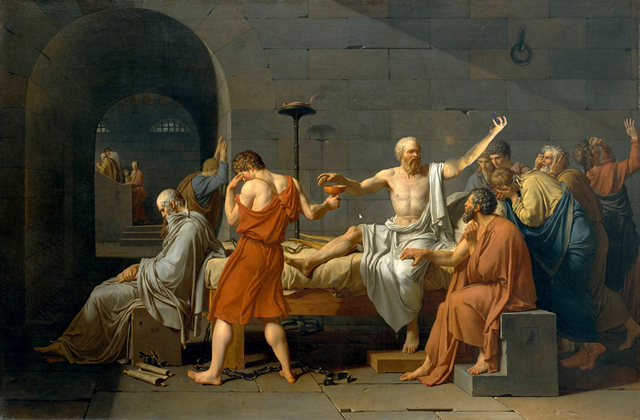Ancient philosophy. Life and creativity of Socrates. /part 4/
Socrates argues that knowledge makes man virtuous. Therefore, on the one hand, he rightly calls what corresponds to state and unwritten divine laws and, on the other hand, points out the benefit as the basis of moral conduct. Hence the definition that good is beneficial to man and gives the good relative character. However, he recognizes the care for the soul and its perfection as an essential and first-time necessity. But due to a lack of systematic research on ethical issues, he could not develop this view.
Although the scientific justification of the Socratic morality is unsatisfactory, he is noble and pure. It requires people to gain independence by limiting their needs, tempering and tempering, and appreciating the improvement of the spirit more than all external goods. He praises friendship and wants a man not only to desire, but also to do good to others. Recognizes the great importance of state life and imputes the duty of everyone according to his powers to take part in it. Sam Socrates tried to prepare useful citizens and officials for the state, and demanded such a subordination to the laws that he did not give up, even when he had to execute his own death sentence. By claiming that only knowledge makes people capable of fair actions, he insisted only those who knew how to engage in political activity and to be entrusted with power. Especially severely condemned the hatred for the labor and crafts of the Athenians.
Socrates Theology
As the term "Theology" originates from ancient Greek philosophy, from the Plato disciple Plato, and expresses in the then critical, religious-philosophical thinking the path from the myth to the Logos, the way to reveal the truth of the Divine. Aristotle defines it as theology, respectively. As a "philosophical-metaphysical view of the existence as a being and is the main subject of the so-called" First Philosophy "as" the Doctrine of the Divine ". "Predatory sciences are preferable to all others, and the doctrine of divine" theology "has the greatest advantage over all other mysterious sciences. In Socrates, the main postulate - the culmination of his philosophy is his understanding of God, the belief in Reason, the unconditional supreme sensible norm, have their definitive justification and expression in the recognition of the higher sense - God.
In the ethics and logic of Socrates, however, the demands of rational knowledge and behavior stand out. Often, Socrates' whole significance lies in the establishment of normative principles, but the highest of his principles, this Ideal from which he has inspired and who has served is the Ideal of Perfect Reason. Not only does Socrates base his ethics on faith in God and divine laws, he also considers respecting the gods as one of the most important duties. Not being satisfied with the ordinary faith in God's existence, he seeks to provide sufficient justification for this. Human reason, which is a spiritual beginning other than the body, is part of the universal Divine Reason. The latter acts in man and nature and his actions are good, reasonable and expedient.

This post has received a 3.91 % upvote from @boomerang.